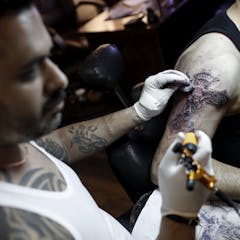
Articles on Tattoos
Displaying 1 - 20 of 45 articles

Some tattoo inks contain unlabeled materials that can cause allergic reactions.

Not all tattoo removal services are licensed, so you’ll have to do some research before booking yourself in. Here’s what to look out for.

Historically, many Christians got tattoos around Holy Week − usually a cross − to honor Christ’s martyrdom.

A tattoo can be a large investment in time, money and pain. Here’s how to look after yours this summer.

Hepatitis C treatments are up to 95% effective when caught early.

Throughout their history, tattoos have helped bind together out-groups.

The ability of professors to freely teach and write about controversial topics without fear of retribution is nothing new.

A series of interviews with recruiters in the banking sector reveals the existence of a dress code to which candidates are expected to conform.

When the 5,300-year-old mummy of Ötzi the Iceman was found 30 years ago, researchers found 61 tattoos on it. A scholar explains how tattoos have been a sacred part of many cultures across the world.

The pandemic has made some people rush to get tattoos for different reasons. A tattoo historian explains why tattoos are often seen to be ‘trashy,’ a view likely influenced by colonialism.

What did all those weird tattoos mean?

Tattoos might be the norm, but Surface Guided RadioTherapy for breast cancer is both more accurate, and doesn’t require a permanent mark.

Researchers are developing tattoo inks that do more than make pretty colors. Some can sense chemicals, temperature and UV radiation, setting the stage for tattoos that diagnose health problems.

In an industry beset by appropriation, the licensing of an Indigenous artwork for use in a tattoo is a rare sign of respect for the intellectual property rights of artists.

We may think tattooing is a modern phenomenon, but the reasons for its popularity are not dissimilar to those seen in the prisons and convict ships of the Victorian era.

An anthropologist works in American Samoa, taking advantage of the island’s longstanding tattoo culture to tease out the effects tattoos have on the body’s immune function.

An exhibition at Melbourne’s Immigration Museum explores tattoo traditions from Samoa, Japan and Melbourne, telling stories of culture, tradition and migration.

Tattooing tools made and used 2,700 years ago include two blades made on human bone.

A tattooed professor explains how the unconventional became rather, well, ordinary. Will we now see more on show in the workplace?

Why is jewellery so important to the story of human evolution? Because it provides a public message – even to people we don’t know.





